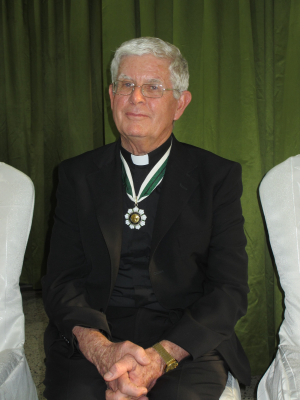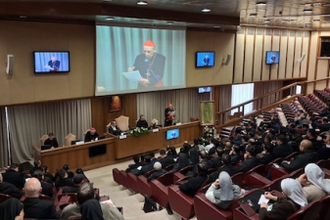Columban priest preaches on St Thomas Becket in Canterbury Cathedral

Fr Robert McCulloch
The following sermon was delivered at evensong on the Feast of St Thomas Becket in Canterbury Cathedral, on Sunday, 29 December 2024 by Fr Robert McCulloch SSC.
We come to consider a murder that took place here 854 years ago, at this very time, in the evening of 29 December.
We recall and remember St Thomas Becket this evening. He was a pastor to his people. He was a priest of pure life. He was a friend and then enemy of his king. He was an archbishop of Canterbury who had lost the support and companionship of the other English bishops. He was a refugee forced to flee England to save his life. But we recall him tonight standing bravely in a nearby corner of this cathedral, at this very time, confronted by armed violent men who threatened him with death unless he would compromise his personal moral integrity and abandon his responsibilities as archbishop for the Church which he knew were entrusted to him by Christ through the Pope.
The Benedictine monks of the monastery attached to the cathedral had gathered for Vespers, just as we are here for Evensong. It would have been cold and chilly as the night came in, just as it is now. Near to where you are sitting is where the monks were. The archbishop Thomas Becket was here presiding. But unlike now, it was an evening of foreboding, of fear and of impending terror. Armoured knights and their entourage had invaded the cathedral precinct and had been tramping about and shouting threats against Archbishop Becket. Mayhem was abroad and the smell of blood seemed to fill the air.
The knights had come from the court of King Henry 11 who was in his French domains and who could not understand or accept the stand that Becket, once his friend, had taken to oppose his own royal policy about the relations between Church and Crown in England. The issue was not a particular English one, nor a new one, but it had ripped England apart socially and religiously in the unsettled conflict between King and Archbishop. The knights were there, thinking to resolve the issue for the pleasure of the King. There were no royal commissions or parliamentary select committees then, just the sharp sword of the royal power versus the excommunication wielded by the ecclesiastical power. Both were recognised to be equally deadly whether in mortal life on earth or eternal life in heaven.
Those four blustering shouting knights, no doubt tanked with alcohol to dull their consciences to the enormity of the violence they were intending, were on the threshold of the cathedral itself. They were violent men, but they had Catholic consciences which told them they were stepping into a mortally moral chasm if they entered the cathedral armed with intent to kill and with the purpose of murdering Becket. The king's favour or their eternal damnation was their choice. They bellowed and stormed from courtyard to hall to room. It reflected the turmoil and noise that was bellowing in their consciences.
Finally, they barged into the cathedral about this very hour in 1170. It was not a time of holy water and genuflections but a prelude to violence. For the monks, gathered for worship, terror was upon them. Becket rose to go to face them. One can imagine the tremulous, weakened volume and tone of the psalm-chanting which custom did permit the monks to stop. Psalms here, and shouting there. Worship here, and butchery there. Armed knights with drawn swords; a vested archbishop; the archbishop's head smashed open, his brains cast onto the floor, he killed by sword thrusts.
The "troublesome priest" was gone. The knights fled in terror realizing the enormity of what they had done. The monks were leaderless. But almost immediately Becket began to make his presence felt. Miracles were happening at his tomb of which the ordinary people of Canterbury were the witnesses.
Nothing much physically remains of him: a few of his episcopal vestments in churches throughout Europe and in Westminster Cathedral in London; some of the books he used and annotated with his own hand; a blood-stained liturgical tunicle that he was wearing when he was killed and which is in the papal basilica of Santa Maria Maggiore in Rome. A few corporeal relics, several of which are in nearby St Thomas of Canterbury Catholic Church. Two motets written in Becket's honour by Palestrina, one of which, Opem nobis O Thoma porrige, Grant us help, O Thomas, was sung at the beginning of tonight's service, and the other, Posuisti Domine, You have placed him O Lord. Both were commissioned from Palestrina by the Venerable English College in Rome in the late 16th century. And there is, of course, behind the high altar in this cathedral, the now-revered place where his shrine used to be.
But there is more.
St Thomas Becket is a saint and a martyr who is remembered every year. He is invoked in the Litany of the Saints, just as we called upon his help from heaven when the entrance motet was sung this evening: Grant us help, O Thomas.
Each time we pray the Creed, we acknowledge our belief in the Communion of the Saints, that the holy ones marked with the sign of faith who have gone before us, and especially the martyrs, are one with us and united with us in their glory in heaven as we struggle and move here on Earth until we too may reach heaven. Rightly we pray: Grant us help, O Thomas.
Last Thursday, on 26 December, the feast of St Stephen who was the first Christian martyr, Pope Francis said, "today there are, in various parts of the world, many men and women who are persecuted, at times up to death, because of the Gospel". The "many men and women" are in fact a huge number, an estimated 450 million, which makes Christians the largest group of religious believers who are being persecuted and who are intensely discriminated against right now because of their faith. As Pope Francis said, "they are bishops, priests, consecrated men and women, lay people and families, of all Christian denominations, who in the different countries of the world have offered the supreme proof of their love of God by the gift of their lives." By the bloody gift of their lives! Is this too shocking to say so close to Christmas? What, then, should we say, for example, about the nearly 40,000 Christians who have been martyred recently in Nigeria and who are no longer able to celebrate Christmas?
This extraordinary witnessing of their faith by millions of ordinary Christians in brutal circumstances is well-documented, as it was in 2018 by the Truro Report commissioned for and accepted by the British government.
Many holy martyrs such as St Thomas Becket have gone before us, and we call upon them to accompany us from heaven as we journey here on Earth. Now in 2024, hundreds of millions of our Christian brothers and sisters throughout the world are bent and threatened, but remain faithful to their faith "in spite of dungeon, fire and sword". They love their life so dearly that they are ready to sacrifice it as the best thing they have, so as not to deny their faith in God.
We pray for them. We support them in our generosity. We speak out on their behalf. "To all of them we owe a great debt and we cannot forget them" is what Pope Francis says.
We are one with them. They are one with us. May their cries and sufferings protect us from sin and keep us sure in God's presence.
Fr Robert McCulloch is Procurator General of the Missionary Society of St Columban, based in Rome.
Service booklet: www.canterbury-cathedral.org/media/dj4h3xox/241229-martyrdom-of-thomas-memorial-service.pdf















